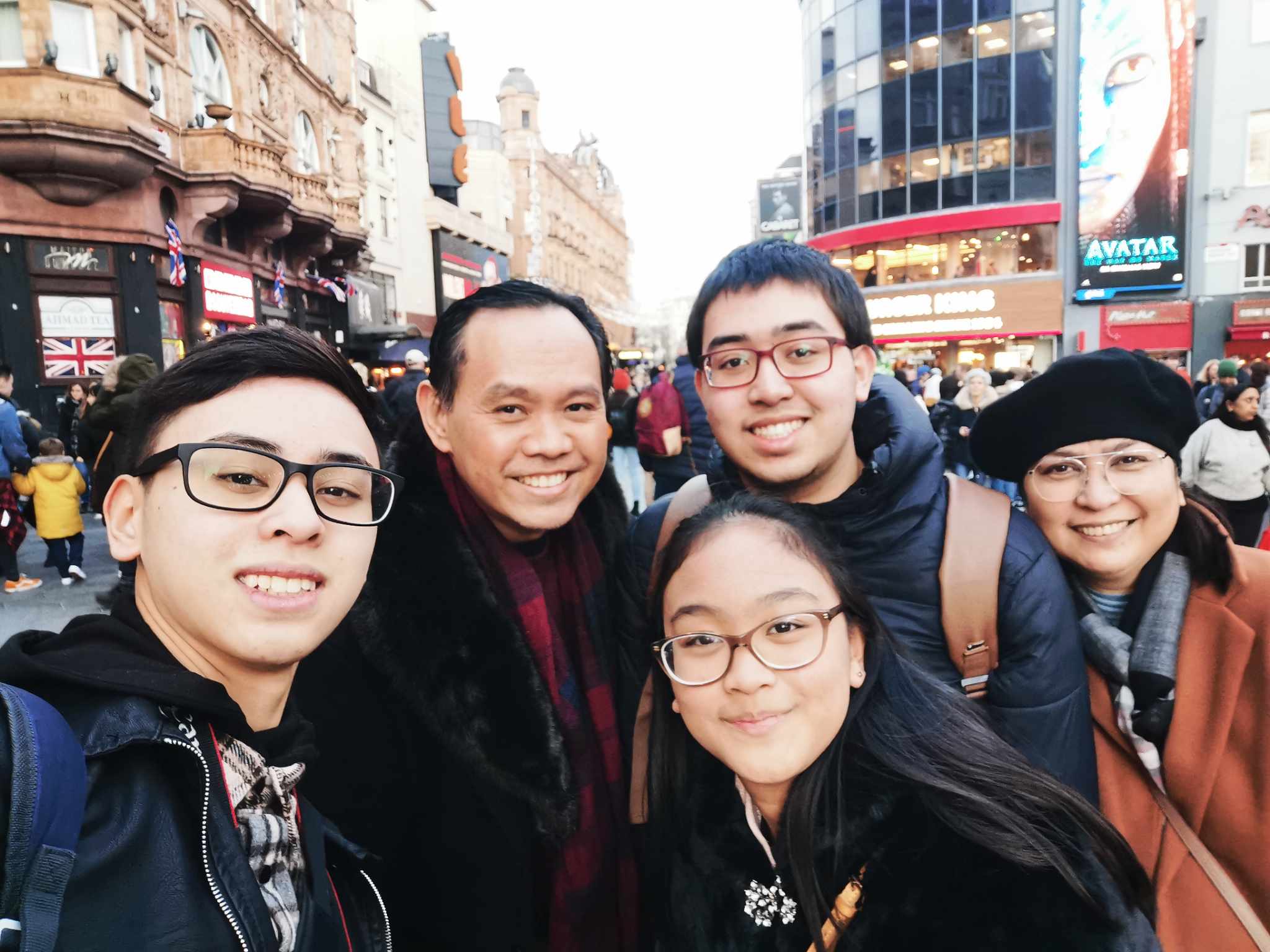Say it again, please – in your Filipino ‘accents’

Left to right: Courosh, Ruanni, Cahmil, Csuresh, Mildred (wife) | PHOTO COURTESY OF DR. RUANNI TUPAS
As a lecturer of English as a Foreign Language (EFL) in Thailand for over a decade, I am still struggling to explain accent versus pronunciation to my students.
Dr. Ruanni Tupas, an associate professor of sociolinguistics in education at University College London, IOE-Culture, Communication, and Media, says that accent is broadly the rhythm of the sounds of words when used in conversation. It also tells where the person comes from. Meanwhile, pronunciation is defined by Oxford as “the way in which a language or a particular word or sound is pronounced.” We usually follow the International Phonetic Alphabet (IPA) which is set as the standard for speech sounds in written form.
Although we have spoken and studied English for as long as we can remember, the distinct accent is still there. My ear could hear a Filipino “accent” despite trying to sound “British” or “American” English.
Accent is always our Achilles’ heel.
‘Promdi eksent’
Filipinos are quick to laugh at “Bisaya or Ilocano accents,” yet we admire kids speaking with a Peppa Pig accent or with an “American twang.”
“Every speaker has an accent. If you are described as someone who has no accent, it means your accent is privileged. It is the standardized accent,” explains Dr. Ruanni Tupas.
READ: English words that only make sense in Filipino
Filipinos ranked number one in the BPO industry due to our neutral accent, which is clear, “unaccented,” and well-articulated.
“An accent is ‘thick’ only if it is undesirable or is spoken by people valued less than others. To put it another way, a ‘thick’ accent is a social judgment, not a linguistic one; thus, ultimately, it is a judgment of its speakers. When an accent is described as ‘thick’, the meanings associated with it are generally negative: unacceptable, backward, baduy, promdi, nakakatawa, useless, and so on,” adds Dr. Tupas.
Dr. Tupas partly blames the media for perpetuating this kind of social judgment. Educational institutions also participated in the mockery or devaluing of the accents of people who did not conform to the “standard” accent.
Dr. Tupas recalls that during his phonology class at UP, he was producing what was intended to be the “standard” American English sound, but the students noticed that it sounded different. He was not sure if he was able to address it then, as he admitted in a 2023 interview with Mario Saraceni of the University of Portsmouth.
READ: Mother tongue in a power play
“The teaching of the so-called ‘standard’ accent is not open to diversity or plurality. It punishes those whose accents are ‘thick’. Rather than focusing on what is said, teachers only listen to the ‘wrong’ accent. Those with non-conforming accents are mocked and punished, leading to academic underachievement or worse, dropping out of school completely,” Dr. Tupas says.
‘Promdi”’ to London
Dr. Tupas speaks from his experiences.
Born in Kalibo, Aklan, he grew up in a multilingual environment. Early on, he realized that despite the number of languages spoken in their province, these were unequally valued. At home, they spoke Aklanon. The “English only policy” in primary school required the students to pay for every Aklanon word spoken. They also have to learn Tagalog in an academic context, similar to “foreign language” learning. He watched delayed news telecasts in English and programs in Tagalog. The Catholic masses and even popular radio dramas were in Hiligaynon, the widely spoken language in Western Visayas.
Dr. Tupas was not all about academics. He excelled in racket sports—tennis, table tennis, and badminton. But an injury ended his would-be stellar athletic career but the sociolinguistics community gained a remarkable scholar. He pursued BA and MA in English at UP Diliman. During his studies, he felt that the language learning theories he was learning were inadequate.
READ: When speaking in English…
“I felt that the theories I was learning were not really helping me understand who I was as a multilingual speaker. They were meant only to understand speakers who spoke only one language. They were also not helpful in making me understand the politics of language I was deeply immersed in – why Aklanon was my dominant language but it was not the privileged language in school, in church, and in the regional and national media,” he laments.
After a brief stint as a lecturer in UP, he decided to pursue his doctorate at National University of Singapore (NUS). He taught at NUS for 10 years, and later at Nanyang University of Technology (NTU) for seven years. During those years, he also raised a family. His three children grew up in Singapore and speak English as their first language. He moved to London with his family in 2019.
‘Non-native term is a microaggression’
Although English and Filipino are the Philippine official languages, we are still classified as “non-native English speakers (NNES).” Therefore, Filipinos are required to take English language proficiency tests if they wish to work or study in countries like the USA, the United Kingdom, Australia, and New Zealand.
Instead of describing as a NNES, Dr. Tupas suggests that we have a choice as how to define ourselves.
“I am a multilingual speaker of English. My being multilingual is a positive contribution to my kind of English. I am a Filipino with an “accent” because I do not just speak English. My “accent” means I have a wide linguistic repertoire, and it is a good thing.”
Being described as a “non-native” speaker of English is a form of microaggression since it is imposed upon us. Dr. Tupas says that in the process, we have come to internalize it as natural.
“Non-native is a kind of negative identification. We are described based on who we are not – we are not ‘native’ speakers of English. Why are we not ‘native’ speakers of English? All the negative values associated with being ‘non-native’ come to mind.”
According to Dr. Tupas, NNES usually apologize for their English in academic settings, including international conferences.
“I still hear many scholars with PhDs who begin their presentations by apologizing for their English, even if in the end their presentations have been stellar with brilliant ideas. I have never apologized for my accent. I only make sure that I am comprehensible to everyone, and that I produce good research.”
Competent despite the accent
As a teacher educator for over two decades, Dr. Tupas has been helping fellow teachers and students reimagine themselves as competent speakers of English.
“We have to question the extremely problematic assumption perpetuated in our field – that native equals ‘competent.’ In real contexts of using English as an international language, being competent in the language is not speaking with the correct accent. Rather, it is being knowledgeable of appropriate ways of engaging with people of different backgrounds with different accents and languages, and still be understood,” he explains.
The Philippines has over 182 languages and hundreds of dialects. So, having an accent when speaking English or other languages is natural.
Dr Tupas also speaks four Philippine languages. He confirms research showing that learning languages as a sort of brain exercise is beneficial to brain health. It also allows more participation in political and social activities in multilingual communities. Learning a new language also creates intercultural spaces between people who otherwise might not interact with each other.
“I guess the challenge really is how we should treat all languages as equal. Majority of people in the world are already multilingual, except that the languages they speak are deemed unimportant. Even with their multilingual repertoire, they still are unable to access privileged knowledge (e.g., health information, emergency instructions) available only in the dominant languages,” he says.
‘Sexiest accent’
Now, Filipino accent has been voted as one of the sexiest accents in the world and number one in Asia. But what Filipino accent is this?
Dr Tupas has his take on this.
“Did anyone ever ask how ‘the’ Filipino accent has become the ‘sexiest’ accent? Why did many Filipinos accept it as a ‘fact’? The use of the in the Filipino accent as if we are a homogenous group of speakers who speak only with one accent. The fact that many Filipinos are themselves discriminated against by fellow Filipinos proves that we have diverse accents because we are multilingual in different ways.”
So, if the Filipino accent is sexy, who are these sexy Filipinos?
Dr. Tupas’ latest edited book Investigating Unequal Englishes Understanding, Researching and Analysing Inequalities of the Englishes of the World published by Routledge will be released on May 22, 2024.

